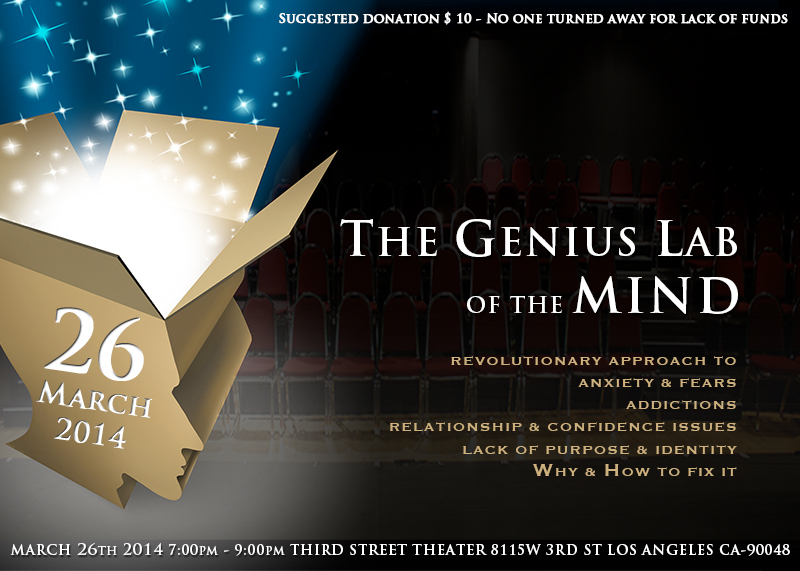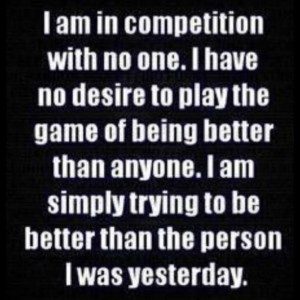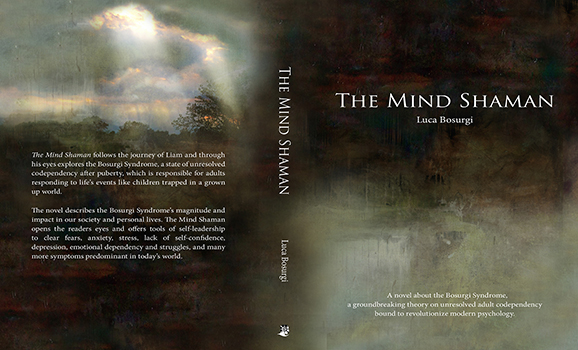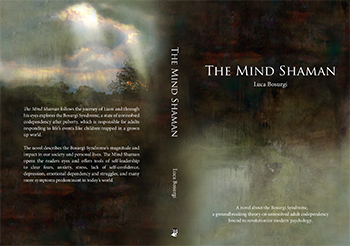From the book The Mind Shaman –
“The Bosurgi Syndrome is a condition that describes an overextended codependency. Codependency is a natural stage in human psychological development and occurs in childhood. As part of our survival system, it acts to keep children psychologically dependent upon the parents in order to keep the children safe while they are physically and mentally vulnerable. It also allows children to be receptive to their parents’ tutoring and leadership. In essence, it is a tool offered by nature to our parents to protect, educate, and raise us. It also keeps us close to our parents so that we don’t wander away from home at an early age when we are not equipped to navigate the world.
“The codependency period starts at birth and ideally continues until puberty, around the age of twelve to fourteen. During the codependency period, the developing mind of the child is dependent upon the parents for leadership, security, validation, and guidance. Ideally, the parents will give the child leadership, unconditional love, validation and precise guidance, and will teach the child how to lead itself so that the child can begin to exit codependency around eight years old. The full transition to complete self-leadership should occur around puberty. Correct termination of the codependency period allows the young adult to become emotionally independent and equipped to lead and live an efficient and balanced adult life.
“The codependency period is naturally terminated by the mind, when the mind detects that the self-leading learning process has been completed. The mind will not terminate codependency until it is unconsciously confident that sufficient self-leadership is in place. Codependency may remain active in some cases throughout an adult’s entire life.”
“Liam, have you ever asked yourself why puppies are anxious when they are separated from their mother? The answer is at the base of my discovery. All mammals during the first vulnerable and inexperienced period of life are forced by nature to seek the protection of adults, typically their mother or both parents. This is a natural instinct that makes the puppy feel unsafe and anxious if it is unprotected—it is called codependency. Codependency is a healthy temporary instinct, part of the survival system, which disappears automatically when the puppy becomes a self-sufficient adult dog, able to be independent and protect itself.
“In the human, the codependency is much more sophisticated. It is active during our first twelve years of life with a variety of restrictive feelings. It makes us dependent on our parents because it is unsafe to be out in the world on our own. It makes us feel anxious and insecure if we are left unprotected. We look up to adults, and we seek their guidance and leadership. We need a lot of love and validation. So we act in ways to please grown-ups. We resent it if we are unguided, and we feel unlovable and not good enough if we are rejected. This instinct is supposed to weaken around seven or eight years old when we start developing our own reasoning process and it should terminate at puberty.
“During these first twelve years, nature has entrusted our lives to our parents. They are our protectors, tutors, guides, and source of love and validation. We depend on them to do their job. We deserve to receive their leadership, to constantly feel safe and to get unconditional and unlimited love, validation, and guidance.
“Unfortunately, many parents are unable or just unqualified to offer proper parenting to their children. The consciousness revolution of the sixties has dramatically transformed our society, making this task much more challenging than ever before. The result is that many kids grow up without the fulfillment of their basic emotional needs and without a good leadership model that can be replicated in the process of becoming adults. The consequence of this is that many young adults are reaching puberty without the leadership tools required to take charge over their own mind, which has been dependent upon their parents since birth.
“So at the time that they are supposed to become independent, they don’t have the self-leadership tools to do it. Their mind consequently doesn’t feel self-lead, and it makes the decision that it is unsafe to give up codependency. It holds onto it. The consequences are devastating. People grow in age, size and experience but the codependency is still active making them feel like a ten-year-old kid unsafe if unprotected, and always in search of external leadership, love, validation and guidance. Remember that codependency is the software program that is supposed to get you safely from age zero to twelve. If the program does not terminate, the body grows, but the mind keeps running assumptions that you are still a child.
“Imagine a ten-year-old girl looking like a thirty-year-old woman that is living an adult life. She feels inadequate, like a child in an adult world, terribly anxious because no one is protecting her, and tries to please other adults to get some love and validation, constantly facing the fear of been rejected, judged, or abandoned. She may also be angry and resentful because she is not receiving the care that she deserves. Sound familiar, Liam? This is the condition described by the Bosurgi Syndrome.”
“The Bosurgi Syndrome is an unnatural human condition that is the result of lack of self-leadership. Our mind is always seeking efficiency and likes to stay abreast with nature. So with enough discipline and education, people affected by the syndrome can establish the self-leadership required to beat the condition. It will take time, but it is certainly possible. Liam, if you want to help your friends affected by the Bosurgi Syndrome, teach them some of the lessons that you will receive during the next sessions. You will be surprised to see that several of them will get it and come out from the Bosurgi Syndrome as if by magic.”
“My school is progressing fast, and I hope that in a few years we will be able to open centers throughout the world. In view of the magnitude of the problem, this is just a drop of water in the ocean. My hope is that the leading schools of psychology will acknowledge the existence of the Bosurgi Syndrome as one of the main psychological issues of this era. This will focus the psychological research to explore my methodology as demonstrated on a large number of cases and provide the clinical statistical work, the rate of success, and the permanent results required to demonstrate the validity of the therapy. For this purpose, I can offer clinical researchers hundreds of clients that have seen major permanent changes in their lives because of CognitiveOS Hypnosis. Unfortunately, the scientific community’s validation process will be very slow and terribly argued, but I hope that one day the medical community will eventually realize the gravity of the problem and start thinking about the available solutions. We have, with CognitiveOS Hypnosis, a very effective method that could offer many licensed professionals a new set of tools to be able to beat the plague of codependency.
“I also hope that more mind researchers, after having embraced the concept of the Bosurgi Syndrome, will find other methodologies able to deal with codependency permanently. Of course, prevention will be the real solution. The Bosurgi Syndrome can be avoided altogether with careful parenting and education. This should become one of our government’s major efforts. It can also be easily treated as soon it manifests itself during the initial stages of the teenage period. I have great success with teens. They are fast and wonderful to heal. My hope is that we will see teams of psychologists helping teenagers to come off codependency.” – The Mind Shaman









